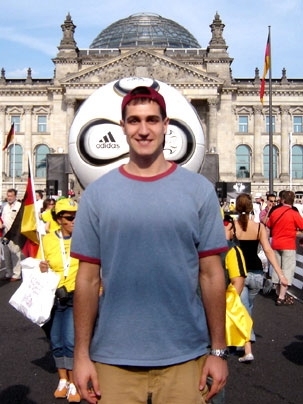Patrik Kunzler is in car heaven. Working for the summer at the Ferrari factory just outside Maranello, Italy, with access to "secret projects," he writes in an e-mail to Cambridge that the factory is "beautiful proof that a positive work environment actually does good things to people. There's a great mixture of local and international culture, intuition and research."
Kunzler, an MIT graduate student in media arts sciences, is one of more than 200 students spending this summer on internships organized by the MIT International Science and Technology Initiatives, or MISTI program.
This year, MISTI has organized internships at companies, universities and nongovernmental organizations in 10 countries: Japan, China, India, Singapore, Germany, Italy, France, Spain, Mexico and Nigeria.
To prepare for their internships, each MISTI student takes two years of a foreign language, attends a two-day retreat and takes a course in the culture and history of the country to which they're traveling.
"We prepare students to hit the ground running," said Patricia Gercik, MISTI's associate director.
About 600 miles from the Ferrari factory, Jacqueline Greene, a junior in materials science and engineering with a minor in biomedical engineering, has arrived at the Institut Curie in Paris. Her work this summer involves studying how lymphocytes kill tumor cells. Using a method called two-photon microscopy together with fluorescent dyes, her team performs in vivo imaging on tumors to visualize exactly how lymphocytes approach and kill tumors.
"The interaction between the immune system and cancer cells is still rather unknown, so it's very exciting to take part in this research project," Greene said.
"Labs in Cambridge, Paris or Osaka don't necessarily approach things the same way. Observing different ways of problem solving is one of the key benefits of these MISTI internships -- and are crucial in helping MIT students to become global professionals," said MISTI's Pat Gercik.
Not all MISTI interns work for companies or labs. Kyle Rattray, who studies brain and cognitive sciences, is spending the summer working with Sigamos Aprendiendo en el Hospital in Mexico City, a nongovernmental organization that is developing an education program for Mexican children with cancer -- so that the children can keep up their education while being undergoing treatment.
And not all the best MISTI experiences are work-related. Two interns in Germany have witnessed the soccer mania of the World Cup up close.
Alexander Krull, a senior in mechanical engineering who is interning at Rolls Royce in Berlin, said, "The World Cup is crazy. Hundreds of thousands of fans showed up."
Krull is working with a group that is designing the gearbox for a new jet engine. Krull reports that he has been "learning a lot about the jet engine and its design, as well as about the characteristics of other aircrafts. And I have been learning a lot about how Rolls Royce functions as a company, and where each individual fits into the overall picture."
Anna Labno, a biology and physics major from Poland who is doing her internship at the Max Planck Institute for Biophysics in Frankfurt, says that on the street, everyone is walking around with flags in honor of the World Cup.
Labno, who is working with 2D and 3D crystallography in a lab that has won acclaim for its work on the structure of OmpG, said, "Working in Germany is quite different than in U.S. People are very relaxed, and work in a more relaxed fashion. They discuss their projects and social issues a lot, but do experiments a little bit less intensely."
For more information on MISTI (which is part of the Center for International Studies), visit http://web.mit.edu/misti/.






